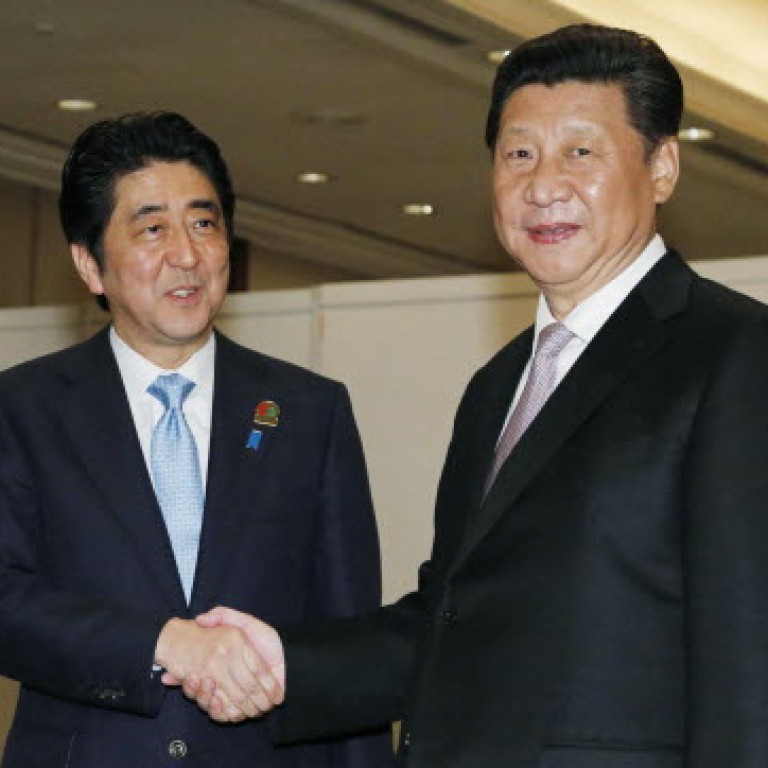
Japan and China both need to face the realities of history
Gary Cheung says while Abe's war speech lacked any sincere reflection, Beijing, too, seems to have trouble separating the truth from fiction
French historian and thinker Alexis de Tocqueville once observed that "history is a gallery of pictures in which there are few originals and many copies". Japanese Prime Minister Shinzo Abe was obviously trying his best to present "copies" and other versions of the wartime history he and his supporters promote when he prepared his statement to mark the 70th anniversary of the end of the second world war.
His speech, on August 14, was full of rhetoric aimed at watering down Japan's responsibility for invading other Asian countries. He said the waves of colonial rule that surged towards Asia in the 19th century, and the Russo-Japanese war, from 1904-05, "gave encouragement to many people under colonial rule from Asia to Africa". But the war was actually fought between the two over rival imperial ambitions in Manchuria and Korea.
Abe went on to say that "with the Great Depression setting in and the Western countries launching economic blocs by involving colonial economies, Japan's economy suffered a major blow. In such circumstances, Japan's sense of isolation deepened and it attempted to overcome its diplomatic and economic deadlock through the use of force." His reasoning, which suggests Japan was left with no choice but to wage war, given the isolation imposed by Western powers, is reminiscent of Japan's wartime leaders' argument that their country was being "encircled by an 'ABCD' coalition" consisting of America, Britain, China and the Dutch East Indies. Abe's lack of sincere reflection makes his argument feeble that Japan's future generations should not have to keep apologising for the mistakes of the past.
Posters and a trailer for The Cairo Declaration - scheduled to hit mainland cinemas on September 3 to commemorate the 70th anniversary of Japan's surrender - imply Mao played a key role at a wartime summit near the pyramids in 1943. Yet he never attended
Yet China is not much better at facing history. A movie, , produced by the August First Film Studio - which has close ties to the People's Liberation Army - has raised many eyebrows for its disproportionate emphasis on Mao Zedong's role in the second world war. Posters and a trailer for the film - scheduled to hit mainland cinemas on September 3 to commemorate the 70th anniversary of Japan's surrender - imply Mao played a key role at a wartime summit near the pyramids in 1943. Yet he never attended. Instead, then Kuomintang leader Chiang Kai-shek, US president Franklin D. Roosevelt and British prime minister Winston Churchill met to outline their position against Japan during the war and map out the future of post-war Asia.
Mao, meanwhile, was in his cave in Yanan , Shaanxi province at the time, sparing no effort to spearhead the Yanan rectification movement to ensure that artists contributed their work to serve the cause of communism.
Chinese history is actually the history of fighting for the power to write history. The movie's far-fetched version of events highlighting Mao is testament to the Communist Party's long-standing position that it was the "pillar of strength" in the resistance against Japan's invasion during the second world war. But a study of the shows that in the early stage of the Sino-Japanese war, Mao advocated guerilla warfare while avoiding direct conflict with the Japanese army.
President Xi Jinping is expected to deliver a speech during the military parade in Beijing on September 3. A speech by his predecessor, Hu Jintao , 10 years ago, may provide food for thought. Marking the 60th anniversary of the end of the anti-Japanese war, Hu gave a rare acknowledgment of the Kuomintang's contribution to the victory over Japan.
"As the main force on frontal battlefields, the KMT army organised a series of major battles, which dealt heavy blows to the Japanese army," he said.

